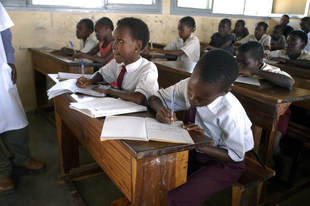
Ten years following the first edition, UNESCO published an updated version of its International Technical Guidance on Sexuality Education. UNESCO developed the guidance in collaboration with UNFPA, UNAIDS, UNICEF, UNWOMEN and the WHO. Sensoa interviewed Karin Nilsson (RFSU, Sweden) who was part of this process.
What is the UNESCO guidance’s target audience?
Karin Nilsson: “The guidance is a technical support for policy makers and other stakeholders in education all around the world. It is meant to guide policy makers and teachers in the national development of programmes on comprehensive sexuality education for kids and young people from 5 to 18. The guidance supports a positive understanding of sexuality and relationships and focus on children and young people’s health and wellbeing.”
Why do the United Nations invest in sexuality education?
Karin Nilsson: “Only 34 percent of youths worldwide is well informed about how to protect oneself from an HIV infection. In some parts of the world, 2 out of 3 girls do not know what is happening to them when they have their first period. In the group of girls aged 15-19 maternal mortality is the second highest cause of death. An evaluation of comprehensive sexuality education worldwide shows that sexuality education increases knowledge on sexual and reproductive health and also helps young people to make informed and responsible choices related to sexual behaviours, which is also essential to prevent problems such as school drop-out and unwanted teenage pregnancies.”
In what way does the new guidance differ from the previous ones?
Karin Nilsson: “The world today is not the same as 10 years ago. Since 2015 the world has agreed on new goals for sustainable development to be achieved by 2030. The guidance now also points to that comprehensive sexuality education plays an important role in achieving the goals on education, health and gender equality. The updated version pays greater attention to human rights, gender equality and social norms, but also addresses new communication technologies and social media challenges, for example the spread of incorrect information, sexting or cyber bullying.”
Do you expect opposition to the guidance?
Karin Nilsson: “Even though the guidance is based on the latest scientific evidence and put comprehensive sexuality education within the internationally agreed framework of human rights and gender equality, opposition is still to be expected. There are those who oppose sexuality education at school, who are convinced that sexuality education is harmful for children and young people, although the opposite is a fact. Children and young people who have access to quality comprehensive sexuality education will make more informed decisions about their own body and sexuality, have sex later and run less risk of sexually transmittable diseases and unplanned pregnancies.”
The new guidelines can be found on UNESCO’s website
Comprehensive sexuality education will be an important theme of the international conference by Educaid and Be-cause health of May 17th at the Egmont Palace in Brussels, "Health and Education: Stronger Together" which will focus on the interdependency of quality education, safety at school and good health. Joanna Herat of UNESCO will be one of the guest speakers.
Karin Nilsson: “The guidance is a technical support for policy makers and other stakeholders in education all around the world. It is meant to guide policy makers and teachers in the national development of programmes on comprehensive sexuality education for kids and young people from 5 to 18. The guidance supports a positive understanding of sexuality and relationships and focus on children and young people’s health and wellbeing.”
Why do the United Nations invest in sexuality education?
Karin Nilsson: “Only 34 percent of youths worldwide is well informed about how to protect oneself from an HIV infection. In some parts of the world, 2 out of 3 girls do not know what is happening to them when they have their first period. In the group of girls aged 15-19 maternal mortality is the second highest cause of death. An evaluation of comprehensive sexuality education worldwide shows that sexuality education increases knowledge on sexual and reproductive health and also helps young people to make informed and responsible choices related to sexual behaviours, which is also essential to prevent problems such as school drop-out and unwanted teenage pregnancies.”
In what way does the new guidance differ from the previous ones?
Karin Nilsson: “The world today is not the same as 10 years ago. Since 2015 the world has agreed on new goals for sustainable development to be achieved by 2030. The guidance now also points to that comprehensive sexuality education plays an important role in achieving the goals on education, health and gender equality. The updated version pays greater attention to human rights, gender equality and social norms, but also addresses new communication technologies and social media challenges, for example the spread of incorrect information, sexting or cyber bullying.”
Do you expect opposition to the guidance?
Karin Nilsson: “Even though the guidance is based on the latest scientific evidence and put comprehensive sexuality education within the internationally agreed framework of human rights and gender equality, opposition is still to be expected. There are those who oppose sexuality education at school, who are convinced that sexuality education is harmful for children and young people, although the opposite is a fact. Children and young people who have access to quality comprehensive sexuality education will make more informed decisions about their own body and sexuality, have sex later and run less risk of sexually transmittable diseases and unplanned pregnancies.”
The new guidelines can be found on UNESCO’s website
Comprehensive sexuality education will be an important theme of the international conference by Educaid and Be-cause health of May 17th at the Egmont Palace in Brussels, "Health and Education: Stronger Together" which will focus on the interdependency of quality education, safety at school and good health. Joanna Herat of UNESCO will be one of the guest speakers.

 RSS Feed
RSS Feed